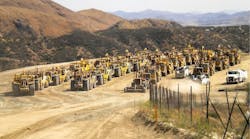At a time when escalating fuel prices continue to rock the construction industry, Congress has yet to act on a long-term strategy for getting the U.S. less dependent on foreign oil. Not one oil refinery has been built in the U.S. in the past 30 years. And California's governor has said he will oppose any drilling for oil off California's coast. Most people question the logic of denying U.S. companies to drill for oil off our coasts and elsewhere. We could develop a variety of alternative energy sources at the same time.
In the meantime, California Builder & Engineer magazine recently asked four California contractors how high diesel and gasoline prices are cutting into their profit margins, and what they are doing about it:
Jeff Buckmaster — equipment manager
Skanska USA, Civil West California District Inc.
• What effects are high fuel prices having on your bottom line?
$100,000.00 per month
• Compared to last year, what percentage of your costs is dedicated to fuel? (i.e., have fuel costs gone up 10 percent, 20 percent or more?)
2007= 17.6% of total equipment costs; 2008 = 21.5% of total equipment costs
• What are you paying as of June 25, 2008, per gallon of gasoline and per gallon of diesel?
Gas — $4.21 per gallon; Diesel — $4.36 per gallon
• What are you doing to conserve fuel? (Idling less? Seeking shorter routes to job sites? Re-powering engines? Etc. ...)
We initiated several new strategies such as a five-minute idling policy, purchasing EPA Smartway vehicles, optimizing routing, upgrading our fleet with newer fuel-efficient machines, and finding ways to eliminate commutes. When we converted our fleet of vehicles to hybrids we had no idea that the cost of fuel was going to increase to its current level. That happened to be a great decision on our part. Good for the environment and good for our bottom line.
• Have you started paying more attention to equipment regarding fuel consumption?
Yes
• What type of fuel savings are you realizing on a monthly basis by using fuel efficient machines?
$40,000 per month
• Has fuel consumption become more of a factor now versus the past when deciding to rent/purchase equipment?
Yes, on every purchase
• What ideas do you have to end these price increases?
We really have no control over the daily price increase of fuel, but we do have control over our consumption. For example, a four-day work week could eliminate up to 20 percent of our commuting fuel use and have the added benefit of reducing air pollution, which is a huge problem in southern California.
The price of fuel may continue to increase and as much as it affects us, we cannot change that. However, Skanska, along with many other companies, will be forced to look for creative ways to confront the challenge of conserving fuel while efficiently running our day-to-day operations.
Kelly Turner — sr. director, Field Services, Top Grade Construction, Inc.
• What effects are high fuel prices having on your bottom line?
Substantial impacts on operating costs.
• What are you paying as of June 25, 2008, per gallon of gasoline and per gallon of diesel?
As of 6/19/08, the price for unleaded fuel was $4.26/gallon and red diesel was $4.11/gallon.
• What are you doing to conserve fuel? (Idling less? Seeking shorter routes to job sites? Re-powering engines? Etc. ...)
We are idling less and also re-powering some of our larger equipment.
• Have you started paying more attention to equipment regarding fuel consumption?
Yes
• Has fuel consumption become more of a factor now versus the past when deciding to rent/purchase equipment?
No
• What ideas do you have to end these price increases?
Expand the search and development of oil reserves both in the U.S. and internationally.
Jerry Pabbruwee of Sukut Construction, Santa Ana, CA
• What effects are high fuel prices having on your bottom line?
We have not been able to forecast the rapid escalation in fuel prices. The result is that our bottom line has taken a hit.
• Compared to last year, what percentage of your costs is dedicated to fuel? (i.e., have fuel costs gone up 10 percent, 20 percent or more?)
68 percent
• What were you paying as of June 23, 2008, per gallon of gasoline and per gallon of diesel?
(Close to) $4.00 per gallon plus state sales tax for bulk diesel.
• What are you doing to conserve fuel? (Idling less? Seeking shorter routes to job sites? Re-powering engines? Etc. ...)
We are compiling data that suggests that we are realizing better fuel efficiency with newer re-powered engines.
• Have you started paying more attention to equipment regarding fuel consumption?
We analyze projects as to whether it is most cost effective to run earth moving spreads with single engine scrapers or twin engine scrapers.
• What type of fuel savings are you realizing on a monthly basis by utilizing fuel efficient machines?
We don't know yet.
• Has fuel consumption become more of a factor now versus the past when deciding to rent/purchase equipment?
No, we are liable for the fuel increases either way.
• What ideas do you have to end these price increases?
The oil supply needs to be increased along with the development of alternate energy sources. We also need to increase the refining capability in this country.
Pete Rasic, president, W.A. Rasic Construction Company, Inc., Bell Gardens, CA
• What effects are high fuel prices having on your bottom line?
High fuel prices are adding to the costs of operation and reducing profitability.
• Compared to last year, what percentage of your costs is dedicated to fuel? (i.e., have fuel costs gone up 10 percent, 20 percent, or more?)
Fuel costs have gone up considerably. They account for a 12-percent increase in operating costs. Wholesale fuel increases have increased 39 percent.
• What are you paying as of June 25, 2008, per gallon of gasoline and per gallon of diesel?
Gasoline $4.63
Diesel (Full Tax) - $5.04
• What are you doing to conserve fuel? (Idling less? Seeking shorter routes to job sites? Re-powering engines? Etc. ...)
Implemented a Company Idling Policy and are currently developing a long term strategy to counteract the imbalance between crude and pump prices.
• Have you started paying more attention to equipment regarding fuel consumption?
Yes, however emerging motor and emissions technologies have generally produced much more fuel-efficient equipment.
• What type of fuel savings are you realizing on a monthly basis by utilizing fuel efficient machines?
The savings, which can be considerable in real dollars, are negligible when you factor in the price increases.
• Has fuel consumption become more of a factor now versus the past when deciding to rent/purchase equipment?
No, the Client's schedule, specifically the most efficient means and methods of obtaining the schedule, is the determinant factor in deciding in what equipment to furnish rather than the fuel consumption.
• What ideas do you have to end these price increases?
Based upon the ratio of crude to pump prices, the current fuel costs will be considered inexpensive in several years. The fuel portion of our current equipment rates will likely significantly increase, and some fleet pieces will likely be safeguarded on expanded project storage sites.



